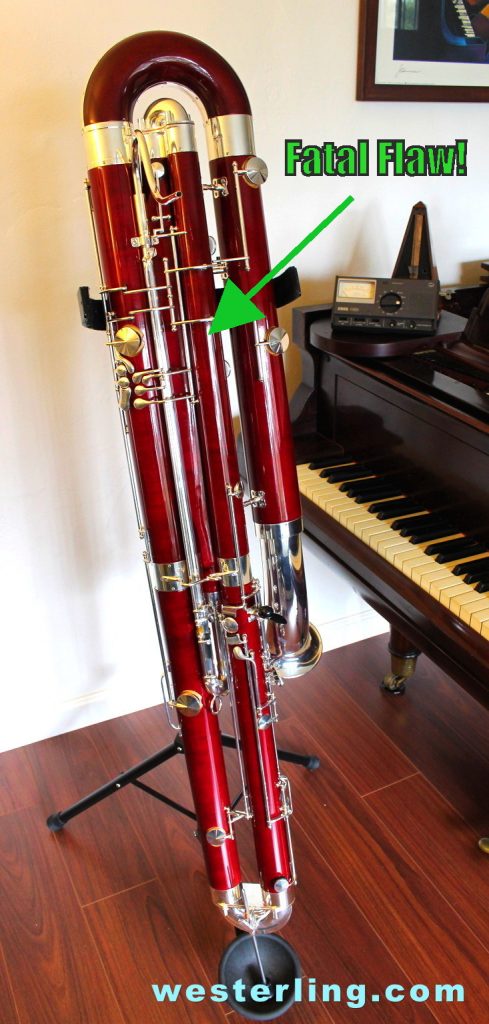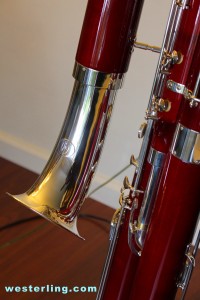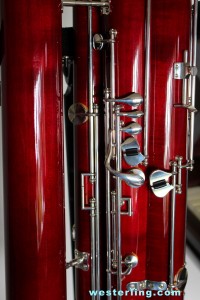The “Fatal Flaw” in Fox Contrabassoon Model 920
- Posted by J W
- on Feb, 12, 2017
- in Music / Bassoon
- Blog 6 Comments.
A fatal flaw!
Update Jan 2020: Unfortunately, I cannot recommend the Fox 920 Contrabassoon to anyone who wants to play at something approaching a professional level. I have a major case of buyer’s remorse and Fox has refused to perform the work required to fix it. Frustratingly, they have also informed any repair people associated with them to refuse to do this work as well. Very sad. Also the man who had made every Fox contra by hand, Chip Owen, has retired.
Update Oct 2021: I’ve gotten several inquiries about this page, and happy to continue corresponding with owners or prospective buyers. Note that another 920 was just posted on musicalchairs. I can’t say whether the owner has similar concerns to what I’ve detailed here, but Fox needs to give serious consideration to providing a “high D” key to the owners of these instruments, if they’re to be treated as a professional level instrument.
Original Post: After playing on this instrument in various ensembles for over two years I have determined that the Fox 920 has a fatal flaw. The high D is not reliable. Anyone who has played a Fox 900 knows this about Foxes. Even adding the extra fingers in left hand, on my contra the note is not even close to reliable. This instrument needs a high D octave key, and the only way you can get one on a Fox contra is to shell out the extra $$$ for the 10 pounds of extra keys that comprise the “Fast System”. Fox will flat out refuse add a high D key to a 900 or a 920. They’ve told all their affiliated repairpeople the same thing. Unfortunately for me and anyone else who purchased this instrument is that they have is an instrument that is not worth buying far as I am concerned since the similarly priced Mollenhauers have offered a D key standard for almost 20 years. Several professional players (who play Heckels) have concurred that this is a serious issue after playing my instrument.
Please submit a note via the comments form below if you would like to know the whole story or if you’d like to help propose a solution to this debilitating problem on what was otherwise a very promising contra model.
(Photos by E. Delchambre)




Mr. Westerling,
I would like to ask you about your Fox 920 contrabassoon, if I may. I am considering purchasing a contra after many years dreaming of owning one, and I found your blog where you discussed the instrument and showed some pictures of it. From looking closely at the photos I think that I have figured out what some of your custom keywork is, namely the elongated low D and the alternate C# next to the upper register key for LH thumb.
Do you ever find yourself instead/also wanting an alternate upper register key between the lower register key and C#? Or is the alternate C# between the two register keys sufficient?
But in the picture showing the keys for the front left hand I am stumped. I asssume that you added an E/F# trill key between the E and D keys? And the one that I am truly confused by is what looks like an extra key for the LH pinky, but located atop a tone hole pad cup. What is that?
Is there anything more you wish you would have gotten, or any keys you didn’t end up using? I definitely went crazy with the options list with my bassoon when I ordered it and there is one key in particular that I sometimes shake my head when I look at it.
Since you have now had some years with the instrument, I would love to know your thoughts on how it plays, and how it compares to other contras you have played, and what you think of the keywork. I played contra years ago but over time I got sidelined into playing bassoon only. I have always had a soft spot for contra though and am now in a position to be able to get one, and hopefully play it in my local orchestra. I am doing whatever research I can in the meantime to make sure I can end up with an awesome instrument.
Fox said that Chip Owen retired. It’s too bad. I got to go the factory a couple of times while going to school in Indiana and I always looked forward to speaking with him.
If you have time to share your thoughts with me I would greatly appreciate it. There isn’t much information out there.
Thank you,
Phil
Can you tell me more, please? I have a 2003-vintage Fox contra, and have some troubles with the notes around high D, where I don’t remember those troubles with an older Mollenhauer I owned previously (never should have sold it!).
Thanks
Charles Shoemaker
Hello,
I will buy a new Moosmann Contra Bassoon.
Is that a good Choice?
Hello Deyaert from California. You can see my review of the Moosmann contrabassoon on YouTube! https://www.youtube.com/watch?v=fU_twixVhc8
Hi Charles. Yes, it is a big problem with the Fox design. I have spoken with several people about this so far. Some people have their favorite fingerings in the right hand to try to help the problem, but there’s no getting around the need for a D octave key on some Fox contrabassoons. As I wrote in my article, Fox refused to install the key, and also notified all of their repairpeople to not do this claiming it is patented. They only way they say you can get a D octave key is if you purchase the entire “Fast system” contra which is $10,000 more in price and has other keys that the average player doesn’t need in my opinion. I am headed to Germany this summer to find another contra with a high D key that works.
Phil,
Thanks for your note. I presume you saw the updates I made to the website detailing the reasons why I cannot endorse the Fox 920, despite working with Chip to create the options and helping to bring the 920 contra to life. The issue is the need for a D octave key. I am spending alot of energy and time trying to figure out a solutions since, unfortunately, Fox is not willing to provide a D key and has told their repairfolks they can’t do it for me either. A real drag. I strongly suggest you contact Greg Henegar in Boston about the similarly priced Mollenhauers. They come with alot of improvements over the older models and are in high demand. – Jonathan